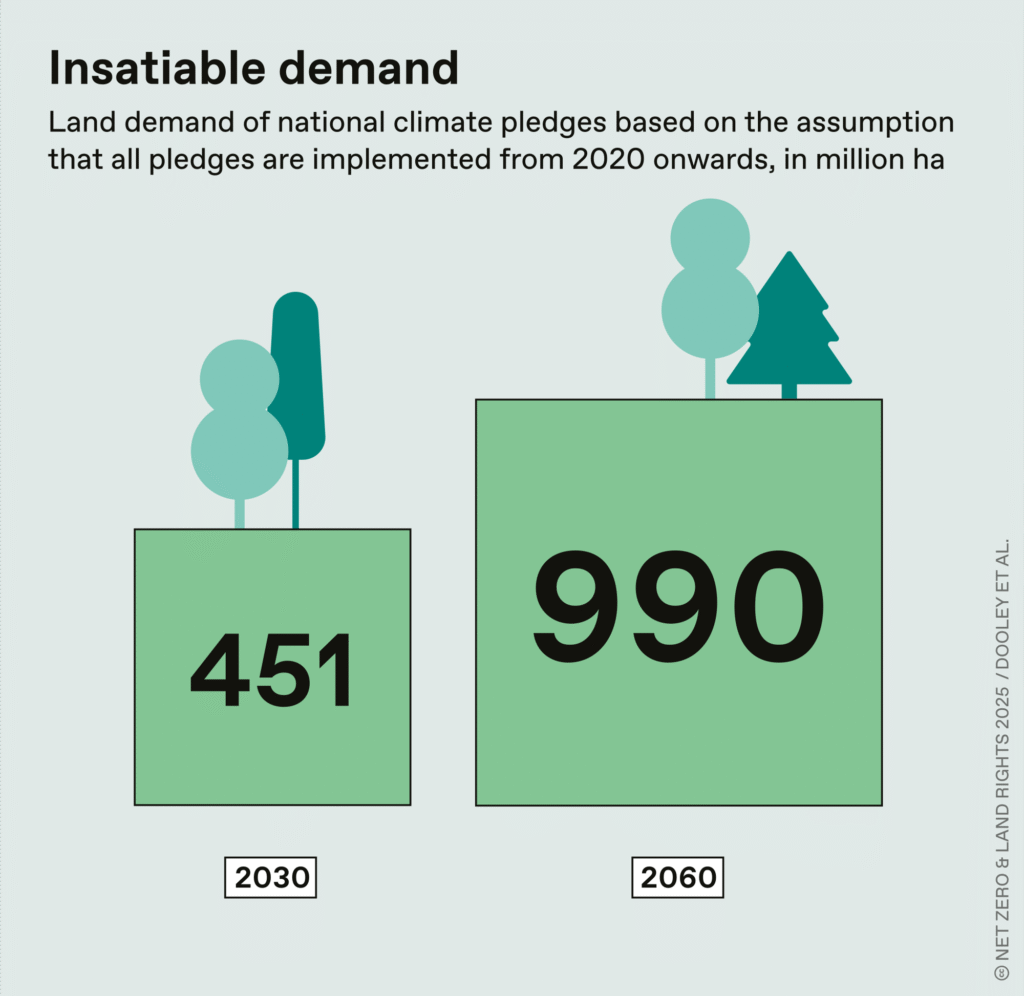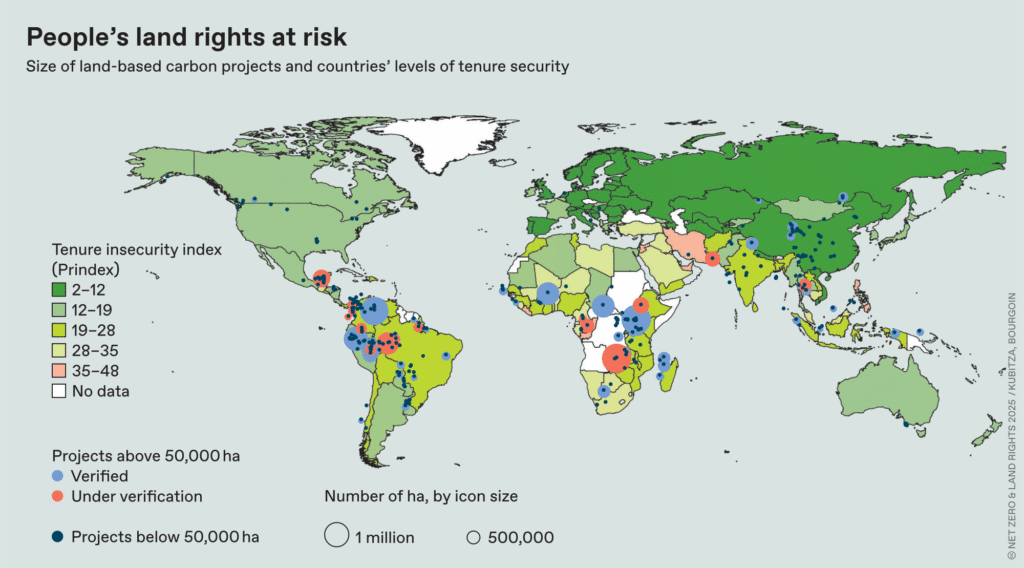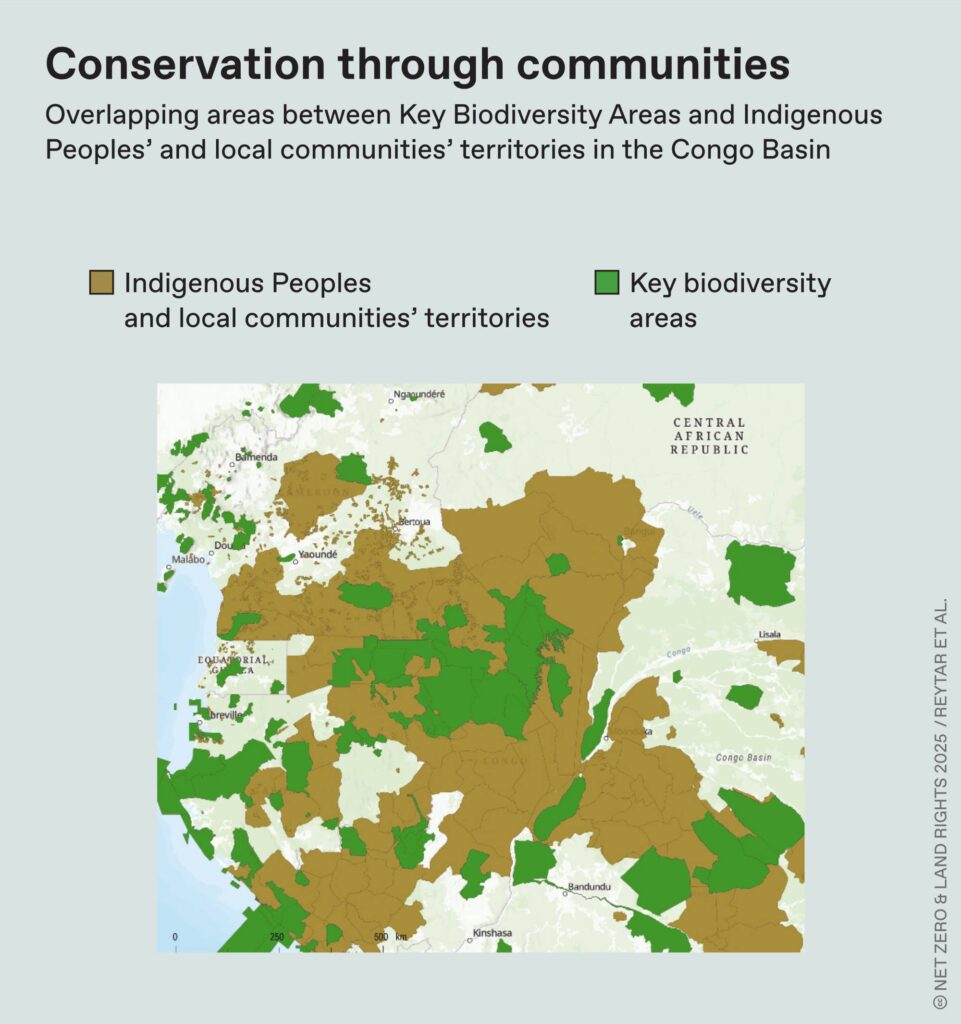As the world prepares for COP30 in Belém, one crucial dimension of climate action remains underexplored: the link between net-zero strategies and land rights. Carbon markets and land-based climate projects are expanding rapidly, but too often the people who live on and depend on these lands are left out of the conversation or even pushed aside.
A new publication, Net Zero & Land Rights, published jointly by the TMG Thinktank for Sustainability and the Robert Bosch Stiftung, warns that the global race for carbon neutrality risks fuelling a new wave of land grabbing if land rights and social justice are not placed at the centre of climate policy. The findings offer a powerful reminder: climate solutions will only endure if they are fair. Philanthropy and its partners can advance fairness in climate action by investing in local capacity building, supporting evidence-based advocacy, and facilitating collaboration between governments and civil society.
The growing pressure on land
It is estimated that up to one billion hectares of land, nearly the size of China or the United States, could be required worldwide for reforestation and restoration projects by 2060 to achieve national climate targets. This enormous demand for land adds to existing requests by agriculture, urbanisation and infrastructure, and the need to protect essential ecosystems. This escalated demand threatens to intensify land-use conflicts, undermine food security, and jeopardise biodiversity, particularly in countries where land tenure systems remain weak.
Already, the scale of carbon offset projects is striking. More than 24 million hectares of land, about the size of the United Kingdom, are currently registered under voluntary carbon markets, and over 90 percent of these projects were launched after 2017. While such initiatives aim to capture or store carbon, which require sustained investments over decades, they are often concentrated in regions where the rights of communities to their lands are not acknowledged.
In these contexts, the publication warns, “climate neutrality at any cost” can translate into loss of access to forests, water, and livelihoods for communities. In parts of Africa, Asia, and Latin America, entire landscapes are being claimed for carbon projects without the Free, Prior, and Informed Consent – a principle recognised in various international legal frameworks – of those who live there.
“High-emission countries such as Australia, Canada, Russia, Saudi Arabia, the United Kingdom, and the United States rely heavily on land-based carbon offsetting abroad—effectively outsourcing their climate responsibility,” warns Dr. Jes Weigelt, of TMG Thinktank for Sustainability. “This distracts from the real goal: reducing emissions at home.”

Land rights are often the missing foundation for Net Zero
The evidence is clear: communities with secure land rights are among the most effective stewards of nature. Indigenous Peoples manage territories that cover roughly 22 percent of the planet’s land surface but sustain about 80 percent of its biodiversity. Yet globally, only 18 percent of their customary lands are legally recognised.
As Dr. Tabea Lissner, Director of Climate Change at the Robert Bosch Stiftung, emphasises, “Climate action cannot come at the expense of social justice. Protecting the land rights of people in the Global South is essential if net-zero goals are to have legitimacy.”
Land rights are therefore not a peripheral issue—they are the foundation for equitable climate governance. Without them, carbon projects risk deepening inequality and eroding trust in global and national climate commitments.

Carbon Markets must respect human rights
At COP29, parties agreed to advance rules under Article 6 of the Paris Agreement, enabling international carbon credit trading. These mechanisms are likely to expand further in the coming years. Yet, the rules and institutions governing carbon markets are still too weak to guarantee fairness and accountability.
Voluntary markets in particular require stronger human-rights-based safeguards, from transparent contracting to equitable benefit sharing, partly because they have expanded so rapidly and remain largely unregulated by governments. Companies also have a duty to respect rights wherever they operate, regardless of state capacity, and governments must align their carbon policies with existing human rights obligations such as the rights to food and housing.
A Just Transition requires legal empowerment
One recurring message in the new publication is the need to equip communities to engage confidently with carbon market actors. Many lack access to legal assistance to understand the consent forms or contracts before signing them, or to independent grievance mechanisms when things go wrong. Shrinking civic space in some countries makes it even harder for them to participate or hold investors accountable.
Philanthropic funding can be transformative here; it is uniquely placed to bridge global policy and local action and ensure that Indigenous Peoples and local communities benefit more from carbon projects, when they choose to engage with them. In the run-up to COP30, three priorities stand out:
- Advance transparency and equitable benefit sharing. Support civil society networks that monitor carbon projects and make data on land deals publicly accessible.
- Strengthen safeguards and governance. Fund policy work that ensures land rights, gender equality, and community consent, as these are integral to national carbon market regulations.
- Empower communities through legal and technical assistance. Invest in organisations helping Indigenous Peoples and local communities to secure tenure, negotiate fair contracts, and participate safely in decision-making.
Organisations like Namati, Impact Kenya and the Grassroots Justice Network provide communities with legal literacy and support to secure recognition of their land. When assistance like this is provided, communities can negotiate better, fairer deals and benefit directly from carbon projects. By backing actions like this, philanthropy can help ensure that carbon markets deliver genuine climate benefits while strengthening social equity and trust.

Tools already exist, but more effort is needed to implement them
While most attention is given to the technical and monitoring standards for carbon projects, much less is afforded to the social safeguards and standards, such as land rights. A wealth of guidance is available to promote best practices and a stronger policy environment for carbon projects, using existing resources on responsible land-based investments such as:
- Namati and the Grassroots Justice Network’s toolkit on carbon justice, which provides practical steps for integrating land and carbon rights into national policies.
- The African Land Policy Centre’s Guiding Principles on Large-Scale Land-Based Investments, which outline concrete safeguards to prevent displacement and ensure benefit sharing.
- The International Institute for Sustainable Development (IISD)’s model contracts and legal templates, which could embed fairness and transparency into carbon deals.
The challenge is not the absence of knowledge, but the lack of necessary resources and political will to put these tools into practice. Governments and investors need to do more to embed strong social standards in carbon market regulations, which would ensure higher social returns for communities as well as sustainability of their investments.
Encouragingly, reform efforts are under way. Standards bodies such as Verra are revising their rules, and several African governments have adopted progressive land laws that recognise collective and women’s land rights. The next step is to link these laws directly to emerging carbon market regulations and ensure that they are enforced.
Looking ahead to COP 30
At COP30, the spotlight will again fall on accelerating net-zero transitions. Yet, as ‘Net Zero & Land Rights’ makes clear, climate neutrality will only be credible if it is rooted in justice. Initiatives such as the African Integrity and Equity Principles for Carbon Markets, set to advance in 2025, offer an opportunity to embed these values.
The call to action is simple but urgent: Put people and rights at the heart of net zero.
Q4 2025 Climate Solutions Magazine
We encourage you to read this edition of the F20 Climate Solutions Magazine in full. The articles focus on the transformative potential that future-forward, bold policy can have.
Expand the preview below and immerse yourself in these thought-provoking articles.
Photo by Rahmad Himawan on Unsplash